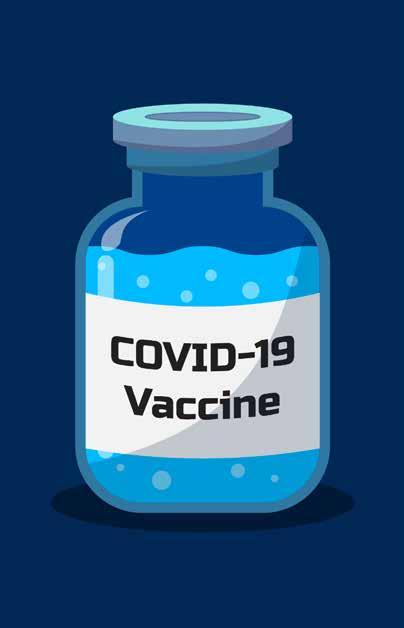
8 minute read
OFM BREAKING
VACCINATING COLORADO
with STRIDE DIRECTOR Shuanti Meyer
by Ray Manzari
Representatives from one of Denver’s federally qualified health centers, STRIDE, contacted OFM looking to educate readers on their current vaccination process. To date, STRIDE community health centers have vaccinated around 4,100 Coloradans.
Colorado.gov is reporting that through the state’s 847 available vaccine providers, more than 1 million cumulative vaccinations have been administered. The U.S. has currently vaccinated 13.3 percent of its population. Colorado has vaccinated about 14 percent of its population. We sat down with Senior Director of Medical Affairs Shaunti Meyer to chat more about the ongoing process of vaccinating Colorado.
What has been the general experience/mood during these vaccine drives?
People are so very thankful and are showing lots of gratitude that they can get a vaccine. Moving from feeling like all we were doing is testing, and having hundreds of people coming back positive every day, to being able to move towards a little bit more of a hopeful process has felt really great.
What symptoms can people expect after getting the vaccine?
It’s quite variable. There were people who really had no reaction at all to the very first vaccine. But, we also then had people who had, from the first dose, high fever, chills, fatigue, nausea, arm soreness. And the second vaccine has been the same; the majority of people who we heard feedback from have gotten a little bit more of a reaction after the second dose compared to the first. We’ve had a very small percentage of people have a bit of a delayed reaction where they might feel fine the next day,

but then three to five days later, begin to feel symptoms. But, the vast majority of people who are going to have a reaction will typically see that 24 to 48 hours after being vaccinated, and it usually resolves within 24 hours.
Would you suggest then, if someone were experiencing symptoms which didn’t resolve after 24 hours, that’d be a good time to go get tested?
Yes, but it’s really 48 hours. If they are still experiencing symptoms after 48 hours [from being vaccinated], then we do recommend they get a test to see if they were exposed to COVID.
What precautions still need to be taken after getting vaccinated?
After the first dose, we really only get to about 50-ish percent immunity. And the full, 95 percent really doesn’t take effect until two weeks after the second dose. It’s important to continue doing exactly what we all should be doing right now anyway. Knowing that it’s not exactly 100 percent immunity, and that we are seeing some different variants that are coming out across the world and in Colorado specifically, we should still be taking some precautions like wearing a mask, washing your hands, staying at least six feet apart.
Is there a significant difference between the Moderna and Phizer vaccines?
You know, from a medical perspective, there really isn’t. The data, efficacy, and safety, are very similar with the two of them, which is really great. The difference is really about the time between the first and second dose. So, the Phizer vaccine right now is 21 days, and the Moderna vaccine is 28 days.
Are you confident that enough Coloradans will get the vaccine in order to achieve herd immunity?
Oh, you know, that’s a tough question to answer. I’m certainly very hopeful, though right now I’m not confident. I still think that there’s a lot of newness to this vaccine, and I think that there are portions of the Coloradan population that, for good reason, feel maybe a little less trustful of the vaccine distribution process. And I do know that the LGBTQ population is part of that. The LGBTQ population on the whole has a tendency to be less trustful of the medical system because of acceptance and safety. The more we can continue to talk openly about those hesitations, and those reasons why people don’t feel as comfortable, will be helpful in building that trust.
When can we expect to see an end to mask wearing/ social distancing?
I will be very honest in that I do my best to try to read information and hear information from trusted, scientific sources. And so, the information that I continue to hear and read is that, we’re hopeful that we can get to where we’re vaccinating the general population in the late summer, so third quarter. My best guess, realistically is the third quarter, late summer, fall.
Is there anything that you want our readers to know?
The fact that I’m a medical provider and that I identify as being part of the [LGBTQ] community, I feel very safe; I’ve gotten my two doses. I cannot tell you how much of a relief I felt after getting that second dose and then getting to the two weeks beyond that second dose. I continue to not change any of my behavior, as far as my interactions with people and patients goes.
What do you want our readers to know about STRIDE?
What’s really nice about our agency and all other federally qualified health centers is that you don’t have to have insurance to come to us; you don’t have to be a legal resident of the United States to come to us. We don’t want finances to be a barrier to quality healthcare. We do dental care; we do behavioral healthcare; we have providers who work with the trans and nonbinary community. We also have the Ryan White program for people who are HIV-positive. We do refugee screenings for people who are coming in from other countries.
SAVING LIVES ONE SMILE AT A TIME
Welcoming New Patients Same Day Appointments Available
Providing comprehensive and integrated oral health care services to adults, youth and children living with HIV/AIDS and other health conditions in a compassionate atmosphere. 303.863.0772

After years of lobbying and lawsuits, X gender markers may soon be coming to passports, social security cards, and other federal documents. LGBTQ advocates began working with the Biden administration to add these nonbinary gender markers to all federal documents, according to the ACLU. “President Biden remains committed to advancing state and federal efforts that allow transgender and nonbinary Americans to update their identification documents to accurately reflect their gender identity, especially as transgender and nonbinary people continue to face harassment or are denied access to services because their identifications documents don’t affirm their identity,” says Matt Hill, a White House spokesperson. Should these new gender markers be added, nonbinary, intersex, and trans people will finally be able to experience the affirmation that arises from being acknowledged by their government. “It cuts across so many areas of discrimination against trans people, whether we’re talking about being respected in school, safety, employment, housing,” says Arli Christian, campaign strategist at the ACLU. The ACLU is also pushing for policy that would allow individuals to change their federal gender markers without submitting medical documentation of a gender change. Currently, 20 states and Washington D.C. have such policies. The White House, however, did not comment on whether they plan on adopting this change. While gender X markers could provide some with much-needed validation and recognition, others argue that visibility comes with a price. Legislation is being considered that would require individuals to use the restroom which matches their gender marker on federally issued IDs. With so few gender-neutral bathrooms, some believe that an X marker would only complicate matters for an already marginalized group of people. Others have expressed concern with potential discrimination when dealing with police officers. According to the National Center for Transgender Equality’s 2015 U.S. Trans Survey, 58 percent of respondents who had interacted with the police in the year prior to taking the survey had experienced some form of mistreatment such as being verbally harassed, misgendered, physically assaulted, or sexually assaulted. It is often in the act of presenting legal identification that trans people face some of the worst discrimination—particularly if their legal gender doesn’t match their gender expression. According to the 2015 U.S. Trans Survey, 25 percent of respondents had been verbally harassed when showing an ID that was incongruent with their gender, while 16 percent had been denied services or benefits, and 9 percent had been asked to leave an establishment. Vice recently interviewed seven nonbinary and intersex people on their experiences with having X gender markers. Here’s some of what they had to say: “Sometimes [people understand what it means], and sometimes they don’t. It depends on the people, and it’s sometimes easy and sometimes tedious to explain. But, it is always worth the effort,” says Jack(ie) Colquitt, 22. “I’ve found that some people are really confused by it, and often in conversations regarding gender markers, I find that people bring up wanting to know what I, or others that identify like I do, were assigned at birth. That can be pretty frustrating, and you can tell that some people don’t understand how or why that could be intrusive because essentially, they just wanna know what’s in your pants,” says Chanlar Rose, 22. “It has meant the world to me. I feel like the state sees my human complexity rather than just a barcode … like I can be seen as a third gender rather than asked to fill a binary because of what is in my pants. I’ve suffered much less overt discrimination since the gender marker X has made it into the national press,” Aidan Hill, 26, told Vice. Through these testimonials, one thing is made clear: the nonbinary experience is often one filled with intrusive questions regarding one’s genitalia. Many also feel the gender-neutral marker was a fundamental validation of their identity. Society has a long way to go when it comes to learning the appropriate ways in which to traverse the subject of gender identity, but should that stop folks from seeking validation through X gender markers? Lawmakers and ACLU advocates would argue not. “Access to an ID that reflects who you are is paramount to the rights of trans people, and so, passing this kind of executive order early in the administration says from the federal government, ‘We see you; we respect you for exactly who you are,’” Arli Christian says.






